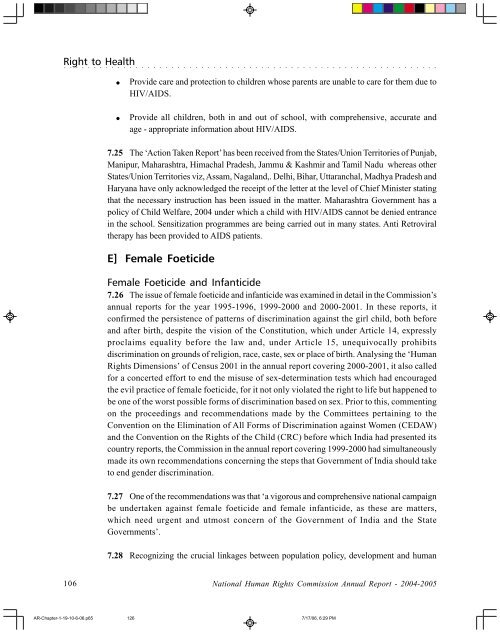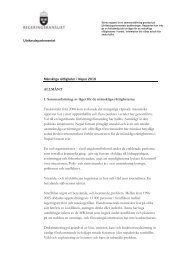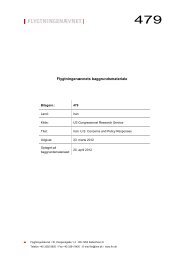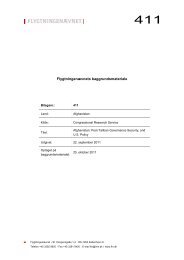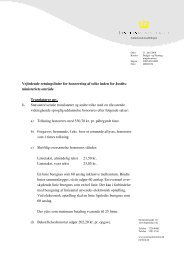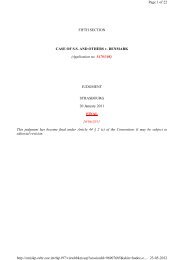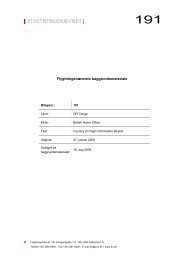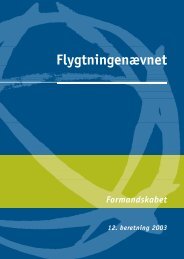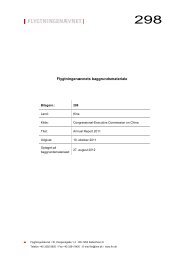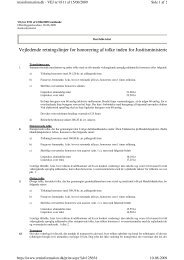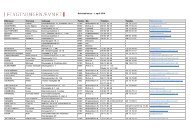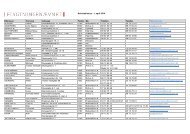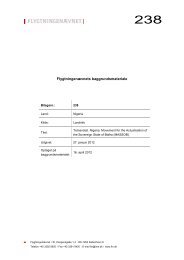Annual Report - National Human Rights Commission
Annual Report - National Human Rights Commission
Annual Report - National Human Rights Commission
You also want an ePaper? Increase the reach of your titles
YUMPU automatically turns print PDFs into web optimized ePapers that Google loves.
Right to Health<br />
○ ○ ○ ○ ○ ○ ○ ○ ○ ○ ○ ○ ○ ○ ○ ○ ○ ○ ○ ○ ○ ○ ○ ○ ○ ○ ○ ○ ○ ○ ○ ○ ○ ○ ○ ○ ○ ○ ○ ○ ○ ○ ○ ○ ○ ○ ○ ○ ○ ○ ○ ○ ○ ○ ○ ○ ○ ○ ○ ○ ○ ○<br />
○<br />
●<br />
Provide care and protection to children whose parents are unable to care for them due to<br />
HIV/AIDS.<br />
●<br />
Provide all children, both in and out of school, with comprehensive, accurate and<br />
age - appropriate information about HIV/AIDS.<br />
7.25 The ‘Action Taken <strong>Report</strong>’ has been received from the States/Union Territories of Punjab,<br />
Manipur, Maharashtra, Himachal Pradesh, Jammu & Kashmir and Tamil Nadu whereas other<br />
States/Union Territories viz, Assam, Nagaland,. Delhi, Bihar, Uttaranchal, Madhya Pradesh and<br />
Haryana have only acknowledged the receipt of the letter at the level of Chief Minister stating<br />
that the necessary instruction has been issued in the matter. Maharashtra Government has a<br />
policy of Child Welfare, 2004 under which a child with HIV/AIDS cannot be denied entrance<br />
in the school. Sensitization programmes are being carried out in many states. Anti Retroviral<br />
therapy has been provided to AIDS patients.<br />
E] Female Foeticide<br />
Female Foeticide and Infanticide<br />
7.26 The issue of female foeticide and infanticide was examined in detail in the <strong>Commission</strong>’s<br />
annual reports for the year 1995-1996, 1999-2000 and 2000-2001. In these reports, it<br />
confirmed the persistence of patterns of discrimination against the girl child, both before<br />
and after birth, despite the vision of the Constitution, which under Article 14, expressly<br />
proclaims equality before the law and, under Article 15, unequivocally prohibits<br />
discrimination on grounds of religion, race, caste, sex or place of birth. Analysing the ‘<strong>Human</strong><br />
<strong>Rights</strong> Dimensions’ of Census 2001 in the annual report covering 2000-2001, it also called<br />
for a concerted effort to end the misuse of sex-determination tests which had encouraged<br />
the evil practice of female foeticide, for it not only violated the right to life but happened to<br />
be one of the worst possible forms of discrimination based on sex. Prior to this, commenting<br />
on the proceedings and recommendations made by the Committees pertaining to the<br />
Convention on the Elimination of All Forms of Discrimination against Women (CEDAW)<br />
and the Convention on the <strong>Rights</strong> of the Child (CRC) before which India had presented its<br />
country reports, the <strong>Commission</strong> in the annual report covering 1999-2000 had simultaneously<br />
made its own recommendations concerning the steps that Government of India should take<br />
to end gender discrimination.<br />
7.27 One of the recommendations was that ‘a vigorous and comprehensive national campaign<br />
be undertaken against female foeticide and female infanticide, as these are matters,<br />
which need urgent and utmost concern of the Government of India and the State<br />
Governments’.<br />
7.28 Recognizing the crucial linkages between population policy, development and human<br />
106<br />
<strong>National</strong> <strong>Human</strong> <strong>Rights</strong> <strong>Commission</strong> <strong>Annual</strong> <strong>Report</strong> - 2004-2005<br />
AR-Chapter-1-19-10-6-06.p65<br />
126<br />
7/17/06, 6:29 PM


